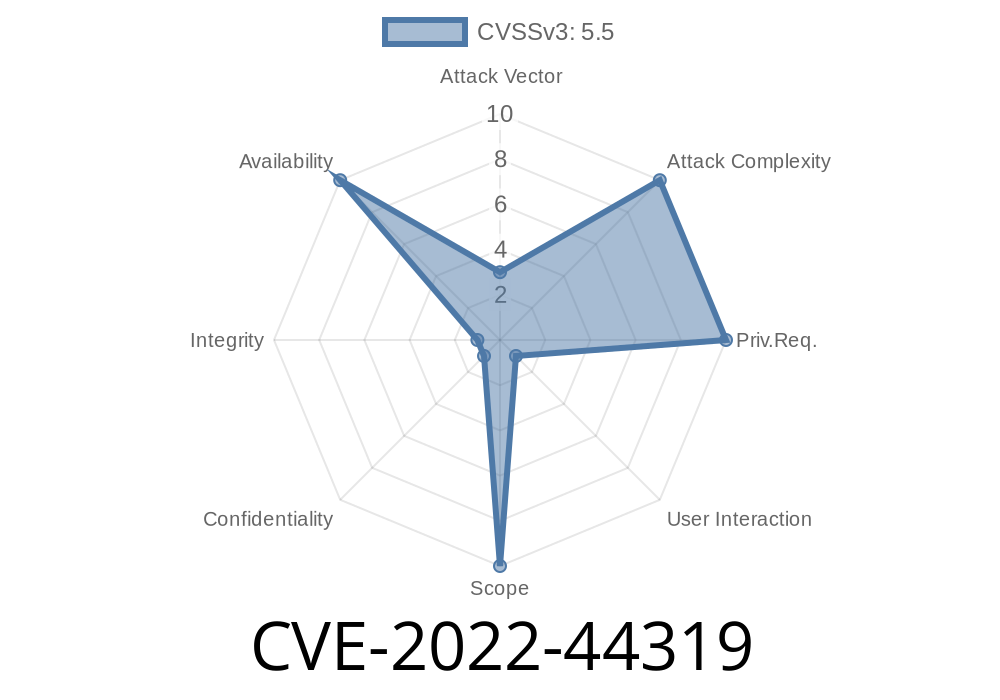When it comes to small scripting languages for embedded systems, PicoC often stands out. Compact, lightweight, and meant for C scripting, PicoC is a frequent favorite for on-the-fly coding in microcontroller environments. But in November 2022, researchers uncovered a serious bug tracked as CVE-2022-44319 that could let attackers take control of systems running PicoC, all thanks to a heap buffer overflow in its StdioBasePrintf function.
In this article, let's break it down in plain terms.
A Quick Overview
CVE ID: CVE-2022-44319
Affected software: PicoC up to 3.2.2
Affected file/function: StdioBasePrintf function in cstdlib/string.c, triggered via ExpressionParseFunctionCall.
Impact: Heap buffer overflow -> possible remote code execution, denial of service, or application crash.
Technical Background
PicoC's StdioBasePrintf function is its core implementation for handling formatted output, similar to C's printf. The vulnerability here stems from unsafe buffer handling when parsing and rendering formatted strings with large or specially crafted inputs.
If an attacker can control the argument to a function that ends up calling StdioBasePrintf, they could write outside the bounds of the allocated heap buffer, corrupting memory and potentially executing arbitrary code.
This is taken (slightly simplified) from PicoC 3.2.2's cstdlib/string.c
void StdioBasePrintf(struct ParseState *Parser, struct Value *ReturnValue, struct Value **Param, int NumArgs) {
char TempString[PRINT_BUFFER_SIZE];
...
vsnprintf(TempString, sizeof(TempString), Param[]->Val->Pointer, *(va_list*)Param[1]->Val->Pointer);
...
}
The Problem
- Lack of bounds checking: The code assumes the output of vsnprintf will always fit in TempString.
- User-controlled format string: If Param[]->Val->Pointer refers to a user-supplied string, an attacker can pass %s or other format specifiers referencing controlled memory.
- ExpressionParseFunctionCall: PicoC's parser allows calling native functions (like printf) with arguments that can originate from the script, making the vulnerable path reachable.
Suppose a user loads the following script into PicoC
char big[1024];
memset(big, 'A', sizeof(big) - 1);
big[1023] = ;
printf("%s", big); // will call StdioBasePrintf under the hood
If the formatted string or an argument is bigger than PRINT_BUFFER_SIZE (like 1024 bytes vs 128), vsnprintf could overflow TempString, leading to heap corruption.
Exploitation Details
1. Input Control: The attacker supplies an oversized string (argument to %s), or crafts a format string exploiting improper handling of format specifiers.
2. Buffer Overflow: The vulnerable function overruns its fixed-size buffer, corrupting adjacent heap memory.
3. Hijack Execution: With certain heap layouts, this bug may allow overwriting metadata (function pointers, control data), enabling remote code execution or crashing the process.
Example Exploit Script
Here’s a PicoC snippet that could crash the interpreter or, with advanced heap feng shui, hijack execution flow:
char payload[1024];
memset(payload, 'B', sizeof(payload) - 1);
payload[1023] = ;
// This line triggers the overflow in StdioBasePrintf
printf("%s", payload);
Alternatively, attackers might reference out-of-bounds arguments with format strings, depending on how PicoC marshals parameters.
Original References
- CVE-2022-44319 at NVD
- GitHub Report
- PicoC Source Code
Mitigating the Risk
Update PicoC: Always upgrade to the latest version of PicoC as soon as a patch is available.
Audit embedded scripting use-cases for potentially unsafe native bindings in PicoC.
Proposed Fix (for developers):
Refactor StdioBasePrintf to properly check lengths before formatting output, dynamically allocate output buffers if possible, and sanitize format inputs.
Final Thoughts
Buffer overflows may sound like relics of the past, but they’re a real threat in lightweight environments where “just enough C” solutions still rule—like PicoC. CVE-2022-44319 is proof that even tiny interpreters need robust security and consistent maintenance.
If you’re using PicoC, review your deployment, update ASAP, and never trust user scripts with native capabilities unless you’re sure they’re safe.
Stay Secure!
If you want to learn more, check out the official report, or peek into PicoC's source code for further analysis.
Timeline
Published on: 11/08/2022 15:15:00 UTC
Last modified on: 11/08/2022 21:56:00 UTC
